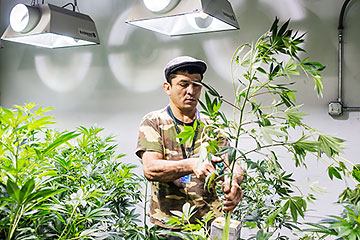
Colorado requires pot shops like Medicine Man togrow 70% of their product. Adults can buy up to 1 oz. at a time for recreational use.
At the front of Medicine Man, a retail cannabis shop on an industrial strip in north Denver, customers wait patiently to buy strains of O.G. Kush and Ghost Train Haze arrayed in glass jars or to sample the menu of pot-infused chocolates, cookies, creams, lozenges and tinctures. In the back, company president Andy Williams strolls the aisles of his cavernous marijuana gardens, pointing out the custom drainage tables and drying racks and a 20,000-sq.-ft. factory addition with crisp white wall panels designed to evoke an Apple Store. "We're building a showcase for the world," he says.
These are heady days in Colorado, which on Jan. 1 became the first state in the world to legalize the sale of recreational pot to anyone over 21. State officials spent more than a year building a market that regulates weed from seed to sale. So far the selling is going just fine. The state's retail pot shops raked in more than $1 million on their first day in business, and demand has barely dwindled since.
The problem is the proceeds. Federal law classifies cannabis as a drug on a par with heroin and ecstasy, which has prevented more than half of Colorado's legal pot merchants from using bank accounts or credit cards. That forces multimillion-dollar businesses like Williams' to operate in cash, which is not just difficult but also dangerous.
As a result, Denver's marijuana moguls sometimes look more like criminals than capitalists. They lease secret off-site warehouses to store their money and pay employees with cash-stuffed envelopes. Some outfit their homes with false walls and safes bolted to the floors. They tote tens of thousands of dollars around and foot five-figure tax bills with thick wads of 20s. To avert robberies, stores often stagger delivery schedules, hire decoy drivers and employ armed guards to monitor dozens of on-site surveillance cameras. Shunned by proper banks, they run their shops as makeshift substitutes. "We're a little fortress," Williams says.
Simple accounting becomes a dizzying logistical puzzle. At Medicine Man, the daily procedures include counting and recounting receipts, spraying the cash with Febreze to mask the scent, stuffing it into tamper-resistant clear plastic bags and shipping it in armored cars to a downtown vault.
"Just managing payroll is a nightmare, let alone paying for a $2 million construction project," Williams says. "That's going to be a pretty damn heavy suitcase." He recalls feeling "like a terrorist" as he ferried $90,000 in a black knapsack to the site of one wholesale purchase in Colorado Springs. Elan Nelson, 35, who works in business development at Medicine Man, remembers spiriting a backpack crammed with $30,000 through an alley near the state capitol to buy weed-laced baked goods from a vendor. Kristi Kelly, 36, spends large chunks of her time shuttling between the two retail pot shops she owns and the windowless vaults where she stores her money, her two dogs in tow for protection.
For the state, the banking problem makes money harder to track, harder to tax and harder to regulate. For the pot industry's pioneers, it requires enormous capital, crimps efficiency and creates the very safety hazards the state was determined to avoid by legalizing weed in the first place. "Somebody," says Williams, "is going to get hurt."
Don't Ask, Don't Tell
